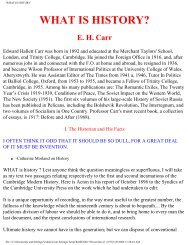The bronze age and the Celtic world - Universal History Library
The bronze age and the Celtic world - Universal History Library
The bronze age and the Celtic world - Universal History Library
Create successful ePaper yourself
Turn your PDF publications into a flip-book with our unique Google optimized e-Paper software.
Chapter XV.<br />
CONCLUSION<br />
WE have now traced in outline <strong>the</strong> history of <strong>Celtic</strong> peoples <strong>and</strong> <strong>Celtic</strong> l<strong>and</strong>s<br />
from <strong>the</strong> Wurmian glaciation to <strong>the</strong> Roman conquest of Britain, <strong>and</strong> have<br />
cited as evidence <strong>the</strong> conclusions drawn from linguistic science <strong>and</strong> an extensive<br />
array of data of an anthropological <strong>and</strong> archaeological character. Though most<br />
of <strong>the</strong> main conclusions arrived at have been suggested before, many of <strong>the</strong>m to<br />
be subsequently discarded as lacking sufficient evidence, <strong>the</strong> main story of <strong>the</strong> Wiros<br />
<strong>and</strong> <strong>the</strong>ir w<strong>and</strong>erings, as I have outlined it above, seems to be compatible with all <strong>the</strong><br />
positive information we possess, though it is in conflict, as I am well aware, with many<br />
<strong>the</strong>ories that have been built upon <strong>the</strong>m.<br />
My views will not, I feel sure, meet with ready acquiescence from some <strong>Celtic</strong><br />
scholars, especially from those who follow Zimmer <strong>and</strong> Kuno Meyer. This school<br />
has for thirty years been eng<strong>age</strong>d in proving that <strong>the</strong>re is no philological evidence for<br />
<strong>the</strong> existence of GoideHc speech in Engl<strong>and</strong> or Wales, except such as was introduced<br />
from Irel<strong>and</strong> in <strong>the</strong> third or fourth century, a.d. I do not wish to dispute <strong>the</strong> philological<br />
evidence, nor do I feel competent to do so. I am ready to admit, at any rate for <strong>the</strong><br />
sake of argument, that no such philological evidence exists. But Engl<strong>and</strong> has been<br />
overrun by Kimri, Romans <strong>and</strong> Saxons, since <strong>the</strong> Gaels are believed to have come, <strong>and</strong><br />
<strong>the</strong> absence of such evidence is not surprising.<br />
I would, however, point out that <strong>the</strong> absence of philological evidence of <strong>the</strong>ir presence<br />
is not conclusive evidence of <strong>the</strong>ir absence. If my equation of <strong>the</strong> <strong>bronze</strong> swords <strong>and</strong><br />
<strong>the</strong> finger-tip pottery with Q speaking people is correct, <strong>and</strong> <strong>the</strong> evidence from Italy <strong>and</strong><br />
<strong>the</strong> Seine valley seems incontrovertible, <strong>the</strong> Gaels not only came to Engl<strong>and</strong>, but<br />
settled <strong>the</strong>re in considerable numbers, <strong>and</strong> even inhabited <strong>the</strong> sou<strong>the</strong>rn slopes of <strong>the</strong><br />
Glamorgan hills. No absence of GoideHc elements in British place-names is proof against<br />
1 68







